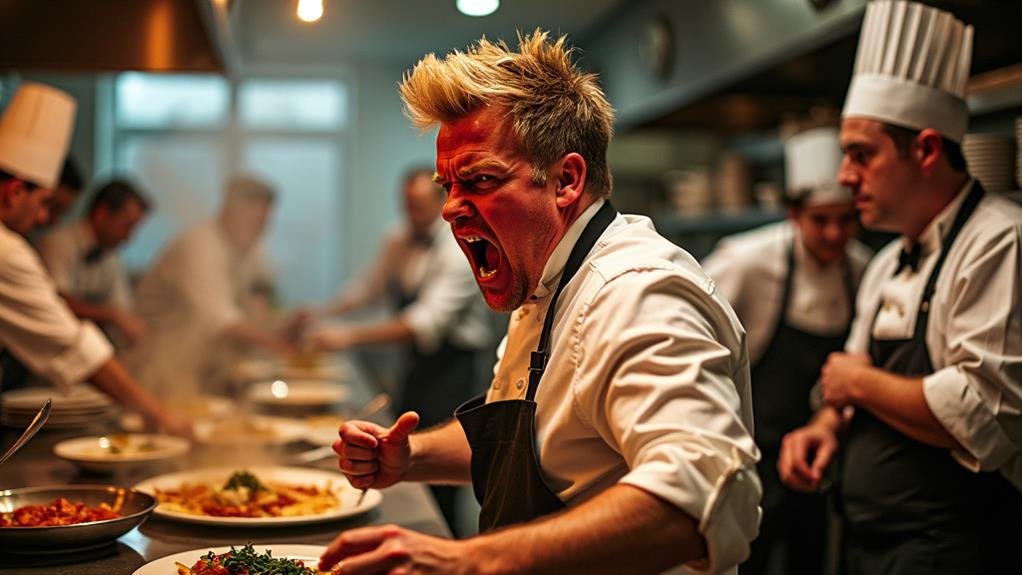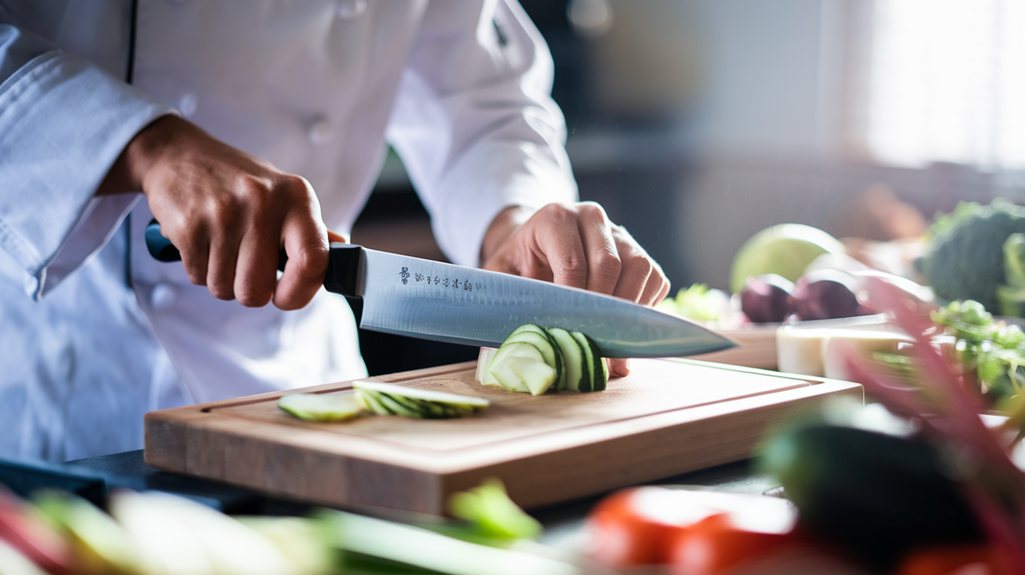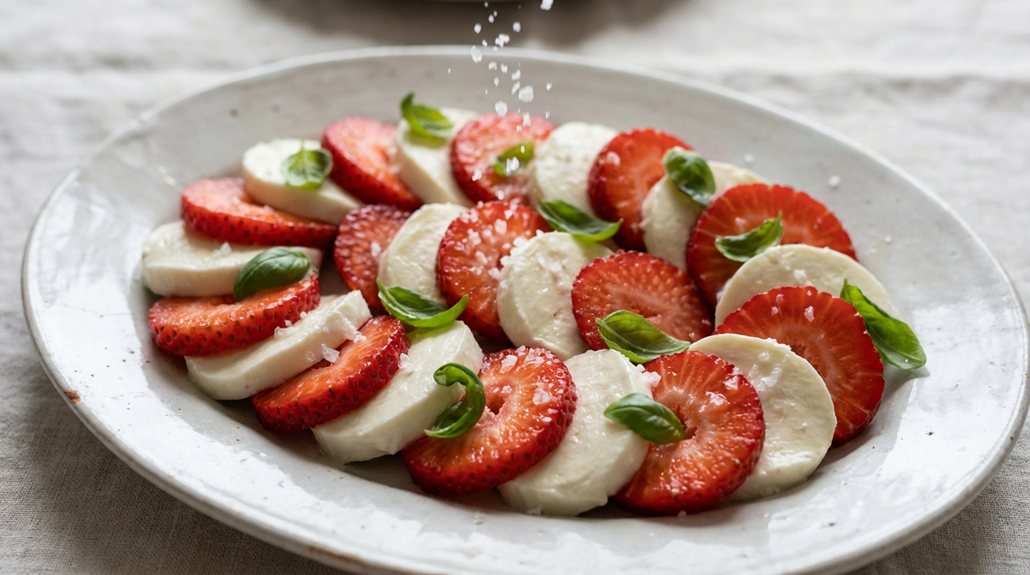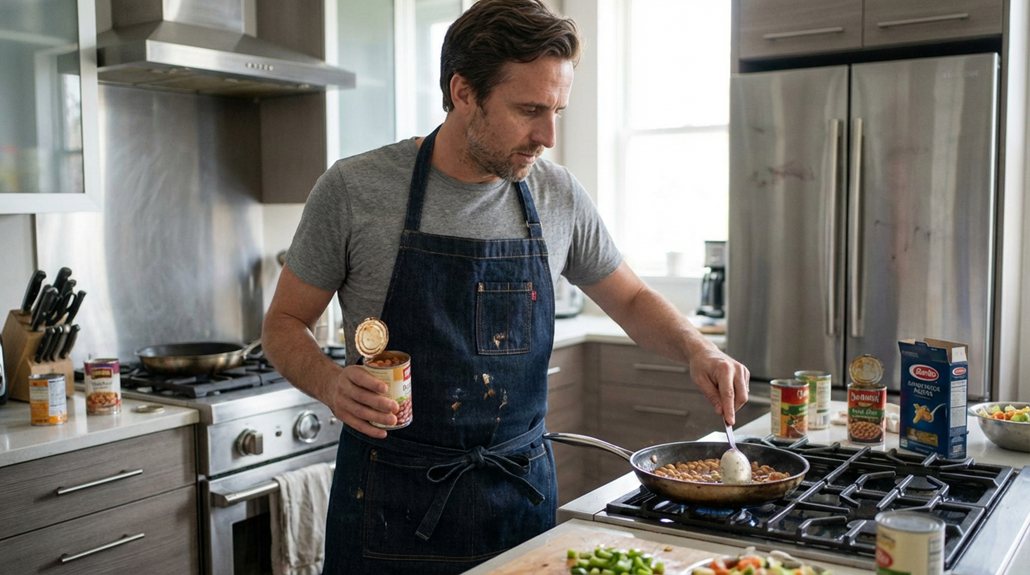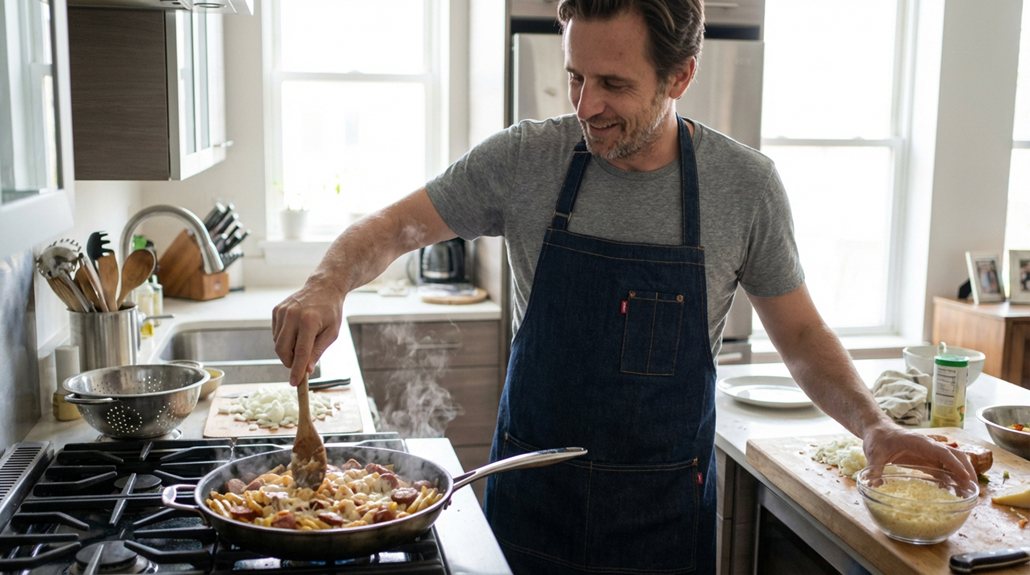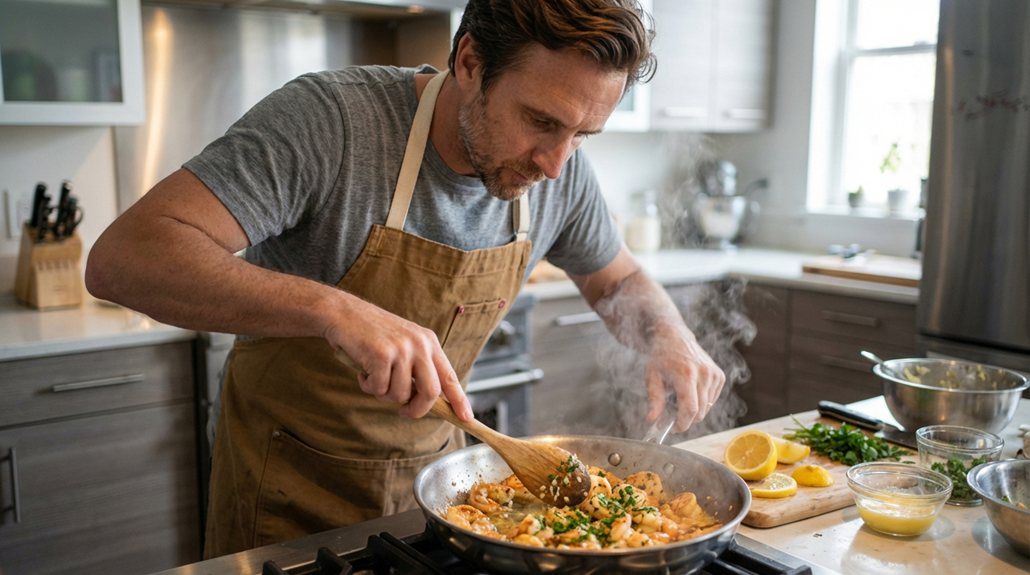Gordon Ramsay's worst insults are memorable for their biting humor and stinging accuracy. He's famously compared undercooked steak to a flip-flop and likened a poorly made pastry to dog waste. These harsh critiques serve not only to entertain but also to challenge contestants' culinary skills, often striking at their self-confidence. His imaginative analogies, such as dubbing a dish "camel droppings," underscore high expectations in the kitchen. Though some chefs thrive under this pressure, others crumble. Ramsay's memorable jabs emphasize his dedication to excellence, shaping the competitive landscape of cooking. The path of resilience continues for those who dare to join.
Insulting Comparisons of Food
Gordon Ramsay's skill for cutting comparisons has become iconic in the culinary realm. His ability to deliver the most brutal critiques with sharp humor is unmatched, often leaving cooks both shocked and motivated to improve. When faced with undercooked steak, he might quip that it resembles a flip-flop, instantly prompting the cook to reevaluate their culinary prowess. Such harsh feedback isn't merely for show; it serves as a wake-up call. His comments can be as memorable as his gourmet creations, like when he assesses a pastry and leaves competitors questioning their understanding of baking, similar to how blondies can turn into a gooey mess if not handled properly.
Ramsay's creativity knows no bounds. He once described a contestant's dish as resembling camel dung, a remark that, while vulgar, sticks in the mind and highlights the importance of aesthetics and taste. In another instance, he likened an improperly prepared squid entrée to animal genitalia, prompting chefs to feel embarrassed yet determined to sharpen their techniques.
Even more nuanced comparisons, like likening underbaked focaccia to dog feces, underline his commitment to excellence. These incisive comments reflect Ramsay's high standards and relentless quest for mastery in the kitchen. Ultimately, while his critiques may hurt, they encourage chefs to elevate their craft and embrace the freedom of culinary creativity, reminding everyone that there is always room for growth.
Unconventional Critiques in the Kitchen
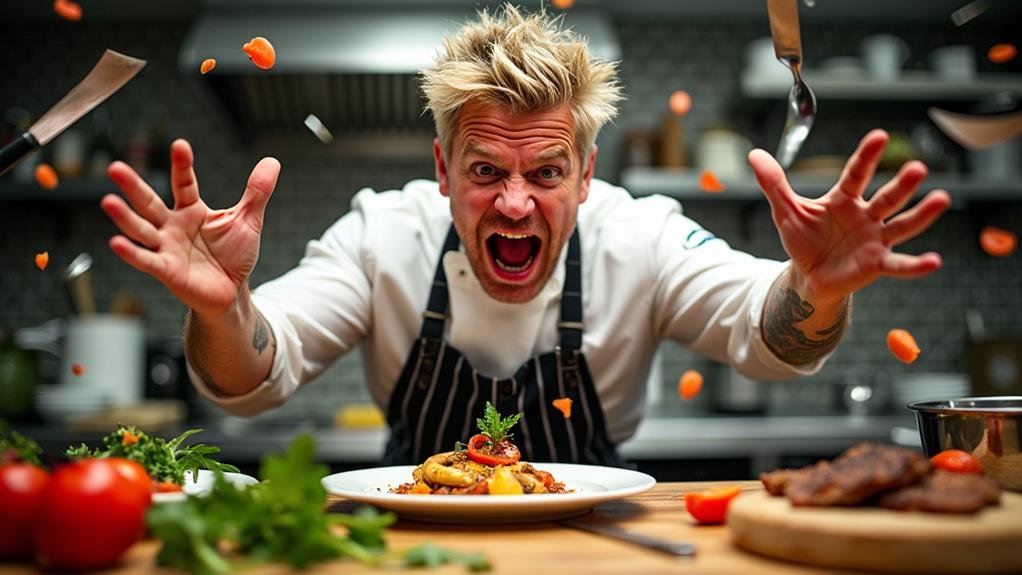
In the intense environment of a professional kitchen, unconventional critiques often dominate, increasing the pressure on chefs who may not be ready for it. Gordon Ramsay expertly uses these evaluations to challenge contestants, pushing them to exceed their limits. His tactics frequently begin with backhanded compliments, creating a false sense of security before delivering a biting insult. This competitive atmosphere escalates with moments of tension, such as the rivalry between Clemenza and Justin, which can disrupt team dynamics. These instances become unforgettable highlights that illustrate Ramsay's distinct style of culinary criticism.
For example, when Ramsay warned a contestant about their disconcerting gaze, likening it to a horror film stare, he was not merely commenting on their demeanor; he was underscoring the significance of concentration and poise in the kitchen. Ramsay's imaginative and often harsh analogies—such as comparing a poorly prepared dish to camel dung—serve a dual function: they jolt contestants into awareness while imparting a lasting lesson on culinary expectations.
While his critiques may leave chefs feeling humiliated, they frequently result in valuable learning opportunities, ultimately refining their skills and fortitude in the kitchen. Ramsay's unconventional methods ensure that each moment in Hell's Kitchen is both gripping and instructive.
Impact on Contestants' Confidence
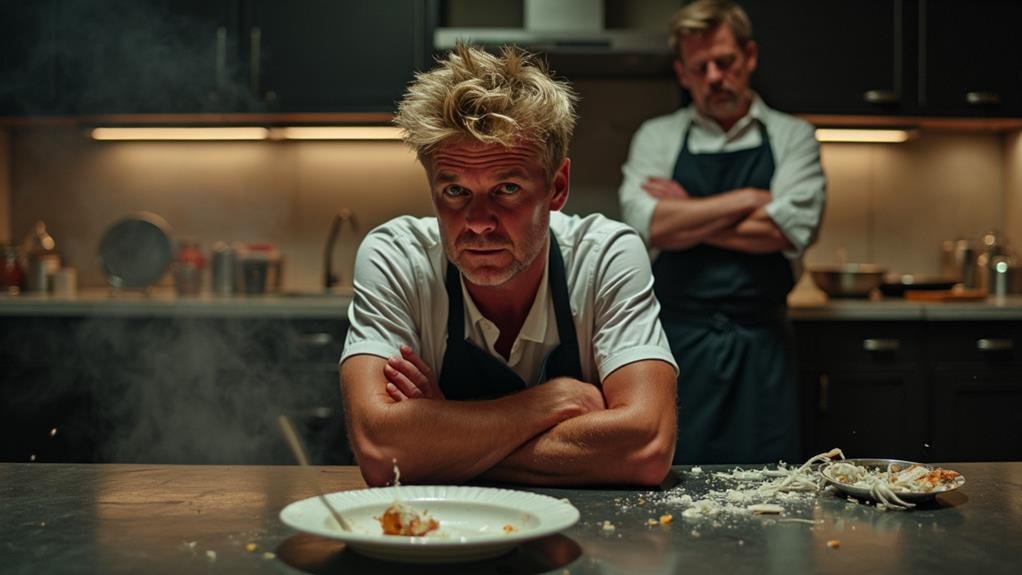
Many aspiring chefs enter Hell's Kitchen with high hopes, eager to experience the fine dining challenge and the excitement of the culinary world. However, Gordon Ramsay's biting critiques can quickly undermine their self-assurance. When he likens a contestant's dish to something absurd, like a flip-flop or animal excrement, it's difficult not to feel disheartened. These jibes often result in public embarrassment, leaving contestants questioning their culinary skills and potential in front of their fellow chefs.
For example, Chef Ariel felt humiliated after Ramsay criticized her squid preparation, while another participant visibly faltered under his harsh comparison. Such instances can drive a chef's self-worth into a downward spiral, particularly in the intense atmosphere of Hell's Kitchen.
Ramsay's method, although severe, aims to push competitors to exceed their limits. Nevertheless, it doesn't erase the emotional burden. Contestants may find themselves grappling with self-doubt, working to rebuild their confidence after each stinging remark.
While some chefs, like Chris, manage to adapt and flourish from these challenges, many leave the kitchen feeling crushed. Ultimately, Ramsay's relentless evaluations can turn an optimistic dream into a demanding journey of self-exploration and resilience.
Memorable Insults That Stuck
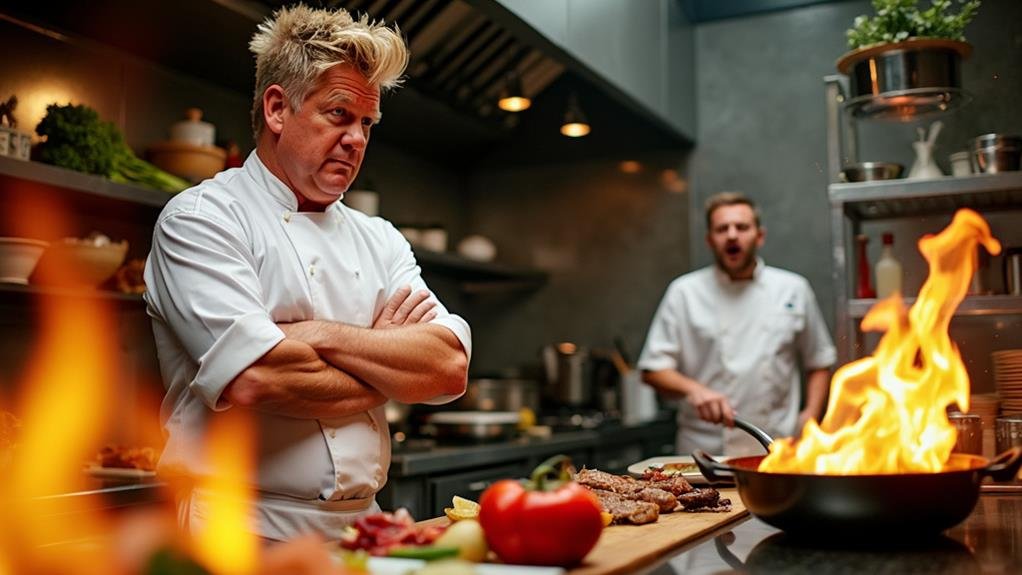
Insults in Hell's Kitchen often become iconic, lingering in the memories of aspiring chefs long after the culinary competition wraps up. Gordon Ramsay's distinctive comparisons, such as likening undercooked beef to a flip-flop or a contestant's entree to camel droppings, leave indelible marks. These remarks transcend mere shock value; they serve as unforgettable lessons that participants carry forward. The high-stakes atmosphere of cooking contests, exemplified by events like the Pressure Cooker Test challenge, heightens the tension and the impact of Ramsay's assessments.
For example, Chef Ariel experienced the sting of humiliation when Ramsay criticized her calamari by drawing a crude analogy. Similarly, when he labeled Chris a "plank," it became a pivotal moment in his culinary journey. Ramsay's critiques often blend humor with harsh truths, ensuring they resonate long after the episode concludes.
One particularly memorable instance involved his remark about unfinished focaccia bread, which ultimately saved Polly from facing an even harsher fate. These unforgettable jabs underscore Ramsay's philosophy of culinary instruction, where each critique serves a meaningful purpose. Contestants learn to refine their skills, adapt, and evolve from these experiences, even if the process is initially painful. Within the intense environment of Hell's Kitchen, these striking moments not only hone their cooking abilities but also build their resilience in the competitive culinary landscape.
Reactions to Kitchen Disasters
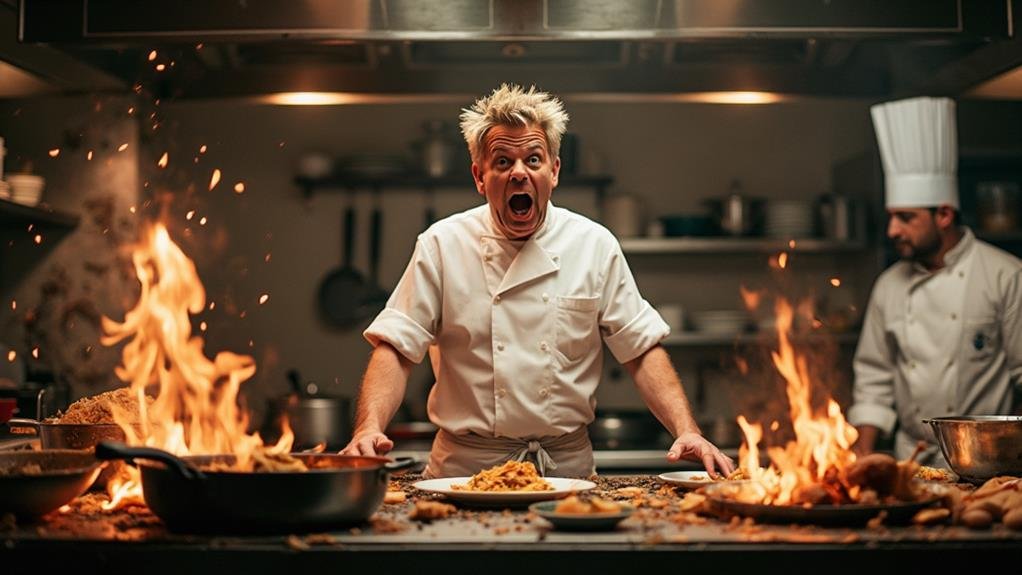
Kitchen disasters elicit strong reactions from Chef Gordon Ramsay, showcasing his fiery temperament and lofty standards. When a meal fails, his reaction often blends astonishment with pointed critique. For instance, if you present overdone beef, he might liken it to a flip-flop, a striking comparison that lingers in your mind. This technique not only underscores the mistake but also reinforces the necessity of accuracy in culinary practices. The same idea holds true for meat choice; opting for inferior cuts for slow roasting can downgrade a dish, while selecting prime cuts can elevate it, emphasizing the importance of proper technique and selection in butchery.
Ramsay's distinctive feedback frequently surprises competitors. He may initiate with a seemingly harmless remark before delivering a harsh jab, such as likening a poorly executed calamari dish to something far less appealing. Although these comments can be stinging, they function as crucial learning opportunities, demonstrating the repercussions of carelessness in the kitchen.
His responses reflect not only irritation but also a profound dedication to culinary mastery. When a contestant offers a subpar dish, Ramsay's critiques, though difficult to hear, aim to encourage growth and development. Ultimately, his passionate feedback underscores the significance of quality and meticulousness, reinforcing the expectations that aspiring chefs must meet to thrive in the competitive world of Hell's Kitchen.
